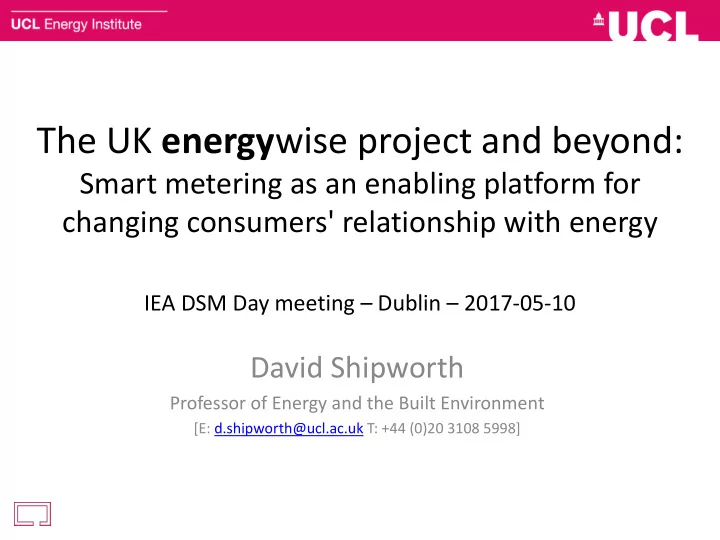

The UK energy wise project and beyond: Smart metering as an enabling platform for changing consumers' relationship with energy IEA DSM Day meeting – Dublin – 2017-05-10 David Shipworth Professor of Energy and the Built Environment [E: d.shipworth@ucl.ac.uk T: +44 (0)20 3108 5998]
Overview • Energy wise – Smart metering and the fuel poor • Smart Meter Research Portal (‘SMRP’) – National access point to smart meter data for research with ≥10,000 participants • Blockchain P-2-P community energy trading – Siemens, UKPN, BP, ESC and others
Awarded £3.3m in 2013 (Total project cost £5.5m)
energy wise trial design • Randomised control design • Two year-long trials: – Trial I: energy saving – 2016 – Trial II: energy shifting (time of use tariffs) - 2017 • 550 participants recruited (~40% response rate) • High drop-out rate (~300 remaining) • Highly ethnically and linguistically diverse community (~40% Bangladeshi community)
at a glance Trial 1: Energy Saving Trial 2: Energy Saving & Demand Side Response Demand profile 1 1 Group allocation Temperature Smart meter Temperature Smart meter ToU tariff logger & Smart logger & Smart Energy efficiency energy energy Energy efficiency devices & advice monitor monitor devices & advice 2 2 Temperature Smart meter Temperature Electric loop ToU tariff logger & Smart logger monitor energy Energy efficiency monitor devices & advice
Customer engagement Dedicated, locally based Customer Field Officer team: Contact from Tailored trusted local materials organisations Face to • Lead on recruitment and engagement face support • Support British Gas in booking appointments and facilitating access to properties where required • Delivery of energy efficiency devices
Key areas of innovation • Customer insights: – Fuel poor customers’ energy savings and shifting response to smart meters and time of use tariffs. • Network insights: – Evaluating the impact of this on network reinforcement. • Customer recruitment & engagement: – Testing fuel poor engage strategies on saving and shifting including the most effective messages and approaches. • Innovative partnerships: – Working with trusted local intermediaries to support those in fuel poverty. • Non-punitive time of use tariffs: – Trialling non-punitive time of use tariffs for both credit and prepayment fuel poor customers.
Energy Social Capital survey
Energy savings (trial I results) • Overall savings (Credit + PPM) ~3.3% – Treatment of outliers important • Pre-payment appeared to save more ~8% – Concerns over small numbers and data quality
Smart Meter Research Portal ‘SMRP’ Vision • Consistent, ongoing channel for accessing energy data. • Energy data at monthly, daily or half-hourly resolution. • Evidence base for intervention, observational and longitudinal studies across the socio-technical spectrum. • Data linking service for contextual data. Grant (Awaiting EPSRC letter of offer) • £6m over 5 years - 2017-2022 • UCL + 6 Academic Partners & EST. • Proposal combines infrastructure & research. • Portal hosted on UKDA’s Big Data Platform. • BEIS support recruitment through government surveys
Smart Meter research Portal ‘SMRP’ Portal programme • A secure, consistent and trusted channel for researchers to access high resolution (half-hourly) energy data • Strictly voluntary participation with regular informed consent • Governance - accredited researchers accessing anonymized data • Mechanism to collect data alongside other variables or future surveys (e.g. EHS) – 10,000 sample collection • Data linking service e.g. to EPC’s • Energy Advice Service for participants from the EST Research programme • Data quality, analytics and engagement and governance • Academic research on energy demand • Government research on the efficacy of policy • Industry research on the low carbon transition TITLE STYLE SUB STYLE
A key behaviour change application: outcome-based policy metrics • Regulating outcomes (performance in use) not inputs (laboratory performance of components) • Advantages vis-à-vis input-based approach – Factors in manufacturing, environmental, and user impacts on performance – Therefore high ecological validity – Therefore lower overall system (e.g. whole building; whole heating system; etc) performance uncertainty – Essential for understanding operational (field) performance. – Best measure of customer relevant operational costs • Disadvantages vis-à-vis input-based approach – Medium/high costs (depending on how implemented) – Higher product performance uncertainty (harder to disentangle other impacts on performance)
Peer-to-peer community energy trading using blockchains Advantages of community energy trading • – Community energy autonomy – Increased energy salience and engagement – Localising economic benefits – Community energy poverty alleviation – Local business CSR and community engagement – Local area grid resilience – Minimising transmission losses – Efficient use of grid infrastructure and minimising reinforcement costs Enabling technologies • – Bi-directional smart metering at ≥ half-hourly resolution – Generation assets (PV; Wind, CHP; Hybrid heat-pumps; DSR) – Storage (preferable) – Half-hourly settlement and time of use tariffs (preferable)
Blockchains as an enabling technology • P-2-P community energy trading requires: – A financial transaction layer that: • Supports product and service innovation • Minimises or eliminates transaction costs – An IoT control architecture that: • Is compatible with component APIs • Supports an ecosystem of smart-controls (smart-contracts; distributed computing, fog computing) • Is distributed to minimise latency and energy, and enhance privacy. • Blockchains provide that transaction and control layer
Current activities at UCL Engage government and the regulator to understand the policy and • regulatory constraints. (Grant application submitted) Test different consumer value propositions (national survey experiments) • Assess cyber-security and privacy considerations (with computer science) • Survey and engage Industry (replicate German survey) • Engage in Energy System Architecture debate (with ESC and ENA) • Scope blockchain system architectures • – Public vs Private? – Consumer vs DSO focused? – Disruptive vs evolutionary energy system roles? Scope blockchain entry points within existing UK energy market • – C2C – e.g. peer to peer trading? – B2C – e.g. household to energy service providers and HEMS providers? – B2B – e.g. energy service providers to distribution system operators? Establish a substantial physical demonstrator •
Recommend
More recommend